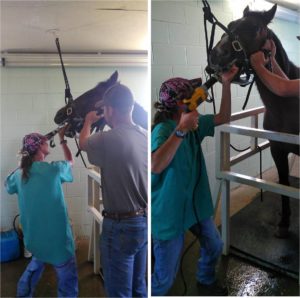Floating Teeth

Veterinarians “float” horses’ teeth by grinding the sharp points off so that it is comfortable for the horse to chew and eat. Pictured: Dr. Meyer of Rushville Veterinary Clinic in Rushville, Nebraska floats the teeth of an old quarter horse.
Horses require a great deal of care. Not only should they have their feet looked after by a knowledgeable farrier, but they should have their other health care needs attended to by a competent veterinarian. Some of these other needs include de-worming, vaccinations and regular dental care.
Horses should have their teeth examined regularly by a veterinarian. They will look for sharp points that can cause cuts on the insides of the cheeks and tongue. These cuts can cause enough discomfort that the horse will stop eating as much as it should. Sometimes, an underweight horse is a sign that there are teeth problems. Besides going off feed and losing weight, a horse with teeth problems may throw its head when being ridden.
The teeth in the lower jaw of the horse are closer together than the teeth in the upper jaw. As a horse chews food, the jaws ideally work in a side-to-side motion as opposed to an up-and-down motion. This constant lateral movement keeps the tops of the teeth (table surface) level. Some horses have a mouth conformation that predisposes them to uneven wearing. Other horses chew unevenly. As domesticated horses get older, some tend to chew less side-to-side and more up-and-down. This tends to make more sharp points on the inside of the teeth in the lower jaw and on the outside of the teeth in the upper jaw.
The veterinarian helps these horses by grinding the sharp points off of the teeth with a small piece of coarse file called a “float.” Older floats were simply pieces of file attached to a long handle. Newer models are mechanized, rotary types. In order to get to the problematic premolars and molars in the back of the horse’s mouth, the vet may use a speculum to hold the horse’s mouth open. In some cases it may be necessary for the vet to sedate nervous horses while doing dental work.
Trained farriers recognize when a horse needs this type of care and recommend a veterinarian to the horse owner. Farriers should not give shots or float teeth on customers’ horses. Even if a farrier knows how to float teeth, it is unwise to “enter the veterinarian’s realm.” It is illegal in many states to “practice veterinary medicine” unless board certified. Even in areas where it isn’t unlawful, it is unprofessional and discourteous. Farriers should build good working relationships with veterinarians. Farriers floating teeth and performing other veterinarian services, are quickly burning a bridge to a resource that they will likely need at a future date. Farriers are better off to refer teeth problems to veterinarians. Vets are likely to reciprocate and refer foot work to the farrier as they receive a lot of referrals from him or her!
If a horse starts to lose weight, throw its head or act uncomfortable, it may be time to schedule an appointment with your veterinarian. Horses generally should be checked once a year for sharp points. Once a horse gets to be older (over 20 years old), veterinarians recommend that the horse’s teeth are floated (or at least checked) every six months.
Related Posts
-
One of the great parts of being involved in the horse indust...Apr 04, 2019 / 0 comments
-
One of the biggest dangers confronting farriers is complacen...Mar 22, 2018 / 0 comments
-
Driving horseshoe nails accurately, consistently and safely ...Sep 28, 2010 / 0 comments
Blog Categories
- Anatomy
- Best Business Practices
- Conformation
- Current Events
- Customer Service
- Draft Horse Shoeing
- Equine Soundness
- Essential Anatomy Kit
- Farrier Careers
- Farrier training
- Foal soundness
- Horse Care
- Horse Foot Care
- Horse Owner Tips
- Horsemanship
- Horseshoeing
- Horseshoeing History
- Iron and Forge Work
- Student Spotlight
- Uncategorized
- Veterinary Care
Blog Archives
Contact Us
Butler Professional Horseshoeing School
495 Table Road
Crawford, NE 69339
(800) 728-3826
jacob@dougbutler.com
Subscribe to Our Blog
Get Our Free e-Book!
If you think you want to become a farrier (or know someone who does), this book can help you make that decision. Horse owners will learn the importance of choosing a qualified farrier and how to select the “right” one.
[ Get the e-Book Now! ]
- Follow:
